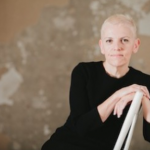Looking Back on OMG 2014: Parent Caregivers Getting It Right… or Wrong
August 5, 2014
By: Pat Taylor
As parents of young adults living with cancer, we strive to “get it right.” To say the right thing, do the right thing… but sometimes we just mess up.
When Mike Lang, a young adult cancer survivor and producer of the web series “Valleys,” asked me to contribute my perspective as the parent caregiver of a young adult living with cancer at his “Lessons from Valleys” session during the OMG 2014 Cancer Summit for Young Adults in Vegas, I jumped at the chance. Maybe my stories could provide some support or insight to another parent in a similar situation.
Mike asked me to share three incidents that occurred during my daughter Sara’s 2.5-year cancer journey that might involve guilty or repressed feelings and consequences of action. Here are the three I decided to talk about:
1) We chose to return to our ranch in the Canadian wilderness to wait for Sara’s tumor pathology report. Sara was resting on her childhood bed. She looked at me, her usually sparkly blue eyes clouded with uncertainty and vulnerability, as I perched on the quilt beside her. Reaching for my hand, she said, “This is scary for Moms, too, isn’t it?”
“No, no,” I said, quickly glancing past her to the familiar view through the window above her head, desperately trying to hide the fiery black hole of panic that she might read in my own blue eyes. As her parent, I thought I needed to be strong for her. I was concerned she might worry more if I was scared, too. Parents aren’t supposed to show fear, right?
That was the end of our conversation that day. I had repressed my own feelings in hopes of sparing hers. But when I revisit that memory I wonder what more she would have shared with me in that quiet, mother-daughter moment, safely hidden away in her childhood room? Maybe if I had been more honest and said, “Yes, it is scary, but I will walk this path beside you no matter what happens. I will never desert you,” she would have talked more about her own fears.
Sara knew me well enough to ask the question. Maybe she wanted me to share my fears. But then again, maybe in that moment she wanted to be my baby girl again, safe within the innocence of childhood, lying in her bed surrounded by her stuffed animals and her horse posters lining the log walls. Either way, maybe we didn’t need to pretend to be strong for one another. Perhaps we could have set some ground rules for communication that would have benefited both of us throughout the rest of her cancer journey. I just don’t know.
2) During Sara’s stay at the BC Cancer Centre, a vivacious 19-year-old testicular cancer survivor named Duke became one of her best friends. He “got it.” He knew the right thing to say or do. But he also challenged her to live her life while she was fighting for it. Sara loved that.
A few months after her stem cell replacement, Sara’s health took a turn for the worse. She had survived the procedure, but it now looked like she might die from not being able to eat. It was scary! Sara was hospitalized until she could keep food down and digest it. A few weeks later, Sara’s condition improved. Still fragile, she began a 12-hour drive with her husband Brad to his summer job. The morning before they left, Brad called to tell me that Duke had died. Due to Sara’s weakened state, we chose to withhold the news from her, as we felt it would make the long drive more difficult for her.
When we shared the news with her later that night, Sara blew up at us.
“You had no right to withhold that information from me. It is my life. I am an adult. Duke was MY friend. I could have spent the last 12 hours thinking about him, all the good times we shared… how much he meant to me.”
In our defense, we were afraid the loss of Duke might put her back in the hospital. But Sara was right. We should have told her. Duke was her friend. We should have let her process the news in her own way. Who were we really trying to protect from more painful news – her, or ourselves? Sara also told us, that day, that Duke’s death did not make her feel that she was going to die, too. Good information for a parent caregiver to know when living in the young adult cancer world.
In retrospect, I do feel guilty and I know I should have handled this part of the story line differently. I get that now.
3) Three months before Sara’s wedding day, her fiancé Brad and I received the news that a recurrence of her cancer was inevitable. For the second time during her cancer treatment, Brad and I chose to withhold information from Sara. She had been through so much: intense chemo, surgery, full body radiation and a stem cell replacement. She did not need fear of a recurrence to spoil her wedding day. She deserved to celebrate life, love and laughter. We all wanted that; needed that. So we made it so! Sara was a radiant bride. She glowed, inside and out. It was her dream wedding come true! She reclaimed her cancer diagnosis date of October 10 by marrying the love of her life on the same day exactly one year later.
When Sara eventually found out that I had withheld the news of recurrence, she was extremely angry with me. Again she reminded me,
“Mom, you had no right! It is my life! I am an adult! I deserve to know what is happening to my body.” It was true. Sara was right. Guilty, I felt sick to my stomach.
In hindsight, would I do things differently? I don’t know. The joy on her face in her wedding pictures, the lack of fear, the fullness of life spilling out of every photograph, the HOPE she instilled in us all that day… all provided us with the strength to carry on even after the inevitable recurrence happened. Thank goodness, Sara didn’t stay angry at me for long. So, with no disrespect to Sara, if I had to do it all over again, selfishly, I might not do it any differently.
As I said at the end of the “Valleys” session at OMG 2014, when parents open the door to honest communication with a young adult child, doing so does not wipe out the potential for conflict. It just provides the space and dialogue to grow, forgive and love! So, yes, parents don’t always “get it.” And sometimes we mess up. But we never quit trying!
This entry was originally posted June 10th, 2014, in The Huffington Post. For more info about Pat Taylor, click here: https://www.huffingtonpost.com/pat-taylor/




